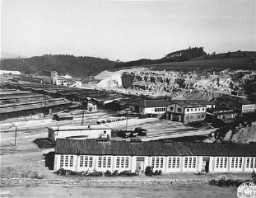You searched for: ghettos
<< Previous | Displaying results 1211-1220 of 1236 for "ghettos" | Next >>
-
The Riegner Telegram
ArticleThe Riegner telegram detailed the Nazi plan to systematically murder European Jews. It was sent to the British and American governments in August 1942.
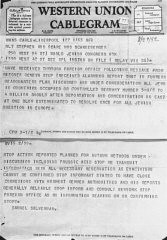
-
Belzec
ArticleBelzec was the first of three killing centers in Operation Reinhard, the SS plan to murder almost two million Jews living in the German-administered territory of occupied Poland.
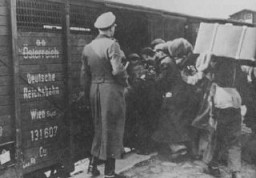
-
Frima L. describes surviving as a young child on her own
Oral HistoryWhile Frima's family was confined to a ghetto, Nazis used her father as an interpreter. He later perished. By pretending not to be Jews, Frima, her mother, and sister escaped a German mobile killing unit massacre. They were later discovered and jailed. Again, her mother devised an escape. Frima's mother and sister were smuggled to Romania, while Frima wandered in search of safekeeping until her mother could arrange to smuggle her out. In Romania, they were reunited and liberated.
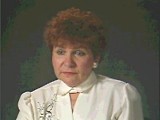
-
Frima L. describes escape from mobile killing unit massacre
Oral HistoryWhile Frima's family was confined to a ghetto, Nazis used her father as an interpreter. He later perished. By pretending not to be Jews, Frima, her mother, and sister escaped a German mobile killing unit massacre. They were later discovered and jailed. Again, her mother devised an escape. Frima's mother and sister were smuggled to Romania, while Frima wandered in search of safekeeping until her mother could arrange to smuggle her out. In Romania, they were reunited and liberated.
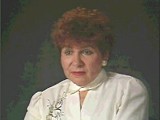
-
Isadore Helfing describes labor in the Treblinka camp
Oral HistoryIsadore was born to a Jewish family in Kielce, Poland. Germany invaded Poland in September 1939. Isadore and his family were forced into the Kielce ghetto, which was established in April 1941. When his parents were deported to the Treblinka killing center in 1942, Isadore went with them rather than remaining behind for forced labor. After arrival at the camp, Isadore hid in a pile of bodies. His parents were killed. Isadore survived by working in the camp. On August 2, 1943, prisoners at Treblinka revolted…
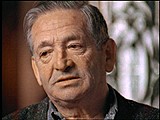
-
Sam Itzkowitz describes the first moments of liberation
Oral HistoryThe Germans invaded Poland in September 1939. When Makow was occupied, Sam fled to Soviet territory. He returned to Makow for provisions, but was forced to remain in the ghetto. In 1942, he was deported to Auschwitz. As the Soviet army advanced in 1944, Sam and other prisoners were sent to camps in Germany. The inmates were put on a death march early in 1945. American forces liberated Sam after he escaped during a bombing raid.
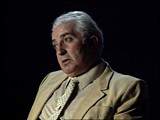
-
Alisa (Lisa) Nussbaum Derman describes postwar emigration with the Brihah movement
Oral HistoryLisa was one of three children born to a religious Jewish family. Following the German occupation of her hometown in 1939, Lisa and her family moved first to Augustow and then to Slonim (in Soviet-occupied eastern Poland). German troops captured Slonim in June 1941, during the invasion of the Soviet Union. In Slonim, the Germans established a ghetto which existed from 1941 to 1942. Lisa eventually escaped from Slonim, and went first to Grodno and then to Vilna, where she joined the resistance movement. She…
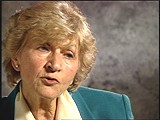
-
Irene Hizme and Rene Slotkin describe being separated from their mother upon arrival in the Auschwitz camp
Oral HistoryIrene and Rene were born Renate and Rene Guttmann. The family moved to Prague shortly after the twins' birth, where they were living when the Germans occupied Bohemia and Moravia in March 1939. A few months later, uniformed Germans arrested their father. Decades later, Irene and Rene learned that he was killed at the Auschwitz camp in December 1941. Irene, Rene, and their mother were deported to the Theresienstadt ghetto, and later to the Auschwitz camp. At Auschwitz, the twins were separated and subjected…
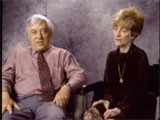
-
Auschwitz
ArticleThe Auschwitz camp system, located in German-occupied Poland, was a complex of 3 camps, including a killing center. Learn about the history of Auschwitz.
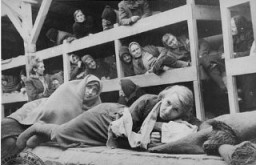
-
Gusen
ArticleIn 1940, the Nazis established Gusen concentration camp. Learn more about camp conditions, forced labor, and liberation.
